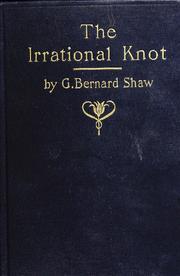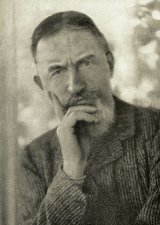The Irrational Knot Page #2
The Irrational Knot was first published in 1905, having been written in 1880. Within a framework of leisure class preoccupations and frivolities Shaw disdains hereditary status and proclaims the nobility of workers. Marriage, as the knot in question, is exemplified by the union of Marian Lind, a lady of the upper class, to Edward Conolly, always a workman but now a magnate, thanks to his invention of an electric motor that makes steam engines obsolete. The marriage soon deteriorates, primarily because Marian fails to rise above the preconceptions and limitations of her social class and is, therefore, unable to share her husband's interests.
So much for my electrical engineer! To get him into contact with fashionable society before he became famous was also a problem easily solved. I knew of three English peers who actually preferred physical laboratories to stables, and scientific experts to gamekeepers: in fact, one of the experts was a friend of mine. And I knew from personal experience that if science brings men of all ranks into contact, art, especially music, does the same for men and women. An electrician who can play an accompaniment can go anywhere and know anybody. As far as mere access and acquaintance go there are no class barriers for him. My difficulty was not to get my hero into society, but to give any sort of plausibility to my picture of society when I got him into it. I lacked the touch of the literary diner-out; and I had, as the reader will probably find to his cost, the classical tradition which makes all the persons in a novel, except the comically vernacular ones, or the speakers of phonetically spelt dialect, utter themselves in the formal phrases and studied syntax of eighteenth century rhetoric. In short, I wrote in the style of Scott and Dickens; and as fashionable society then spoke and behaved, as it still does, in no style at all, my transcriptions of Oxford and Mayfair may nowadays suggest an unaccountable and ludicrous ignorance of a very superficial and accessible code of manners. I was not, however, so ignorant as might have been inferred at that time from my somewhat desperate financial condition. I had, to begin with, a sort of backstairs knowledge; for in my teens I struggled for life in the office of an Irish gentleman who acted as land agent and private banker for many persons of distinction. Now it is possible for a London author to dine out in the highest circles for twenty years without learning as much about the human frailties of his hosts as the family solicitor or (in Ireland) the family land agent learns in twenty days; and some of this knowledge inevitably reaches his clerks, especially the clerk who keeps the cash, which was my particular department. He learns, if capable of the lesson, that the aristocratic profession has as few geniuses as any other profession; so that if you want a peerage of more than, say, half a dozen members, you must fill it up with many common persons, and even with some deplorably mean ones. For "service is no inheritance" either in the kitchen or the House of Lords; and the case presented by Mr. Barrie in his play of The Admirable Crichton, where the butler is the man of quality, and his master, the Earl, the man of rank, is no fantasy, but a quite common occurrence, and indeed to some extent an inevitable one, because the English are extremely particular in selecting their butlers, whilst they do not select their barons at all, taking them as the accident of birth sends them. The consequences include much ironic comedy. For instance, we have in England a curious belief in first rate people, meaning all the people we do not know; and this consoles us for the undeniable secondrateness of the people we do know, besides saving the credit of aristocracy as an institution. The unmet aristocrat is devoutly believed in; but he is always round the corner, never at hand. That the smart set exists; that there is above and beyond that smart set a class so blue of blood and exquisite in nature that it looks down even on the King with haughty condescension; that scepticism on these points is one of the stigmata of plebeian baseness: all these imaginings are so common here that they constitute the real popular sociology of England as much as an unlimited credulity as to vaccination constitutes the real popular science of England. It is, of course, a timid superstition. A British peer or peeress who happens by chance to be genuinely noble is just as isolated at court as Goethe would have been among all the other grandsons of publicans, if they had formed a distinct class in Frankfurt or Weimar. This I knew very well when I wrote my novels; and if, as I suspect, I failed to create a convincingly verisimilar atmosphere of aristocracy, it was not because I had any illusions or ignorances as to the common humanity of the peerage, and not because I gave literary style to its conversation, but because, as I had never had any money, I was foolishly indifferent to it, and so, having blinded myself to its enormous importance, necessarily missed the point of view, and with it the whole moral basis, of the class which rightly values money, and plenty of it, as the first condition of a bearable life. Money is indeed the most important thing in the world; and all sound and successful personal and national morality should have this fact for its basis. Every teacher or twaddler who denies it or suppresses it, is an enemy of life. Money controls morality; and what makes the United States of America look so foolish even in foolish Europe is that they are always in a state of flurried concern and violent interference with morality, whereas they throw their money into the street to be scrambled for, and presently find that their cash reserves are not in their own hands, but in the pockets of a few millionaires who, bewildered by their luck, and unspeakably incapable of making any truly economic use of it, endeavor to "do good" with it by letting themselves be fleeced by philanthropic committee men, building contractors, librarians and professors, in the name of education, science, art and what not; so that sensible people exhale relievedly when the pious millionaire dies, and his heirs, demoralized by being brought up on his outrageous income, begin the socially beneficent work of scattering his fortune through the channels of the trades that flourish by riotous living. This, as I have said, I did not then understand; for I knew money only by the want of it. Ireland is a poor country; and my father was a poor man in a poor country. By this I do not mean that he was hungry and homeless, a hewer of wood and a drawer of water. My friend Mr. James Huneker, a man of gorgeous imagination and incorrigible romanticism, has described me to the American public as a peasant lad who has raised himself, as all American presidents are assumed to have raised themselves, from the humblest departments of manual labor to the loftiest eminence. James flatters me. Had I been born a peasant, I should now be a tramp. My notion of my father's income is even vaguer than his own was--and that is saying a good deal--but he always had an income of at least three figures (four, if you count in dollars instead of pounds); and what made him poor was that he conceived himself as born to a social position which even in Ireland could have been maintained in dignified comfort only on twice or thrice what he had. And he married on that assumption. Fortunately for me, social opportunity is not always to be measured by income. There is an important economic factor, first analyzed by an American economist (General Walker), and called rent of ability. Now this rent, when the ability is of the artistic or political sort, is often paid in kind. For example, a London possessor of such ability may, with barely enough money to maintain a furnished bedroom and a single presentable suit of clothes, see everything worth seeing that a millionaire can see, and know everybody worth knowing that he can know. Long before I reached this point myself, a very trifling accomplishment gave me glimpses of the sort of fashionable life a peasant never sees. Thus I remember one evening during the novel-writing period when nobody would pay a farthing for a stroke of my pen, walking along Sloane Street in that blessed shield of literary shabbiness, evening dress. A man accosted me with an eloquent appeal for help, ending with the assurance that he had not a penny in the world. I replied, with exact truth, "Neither have I." He thanked me civilly, and went away, apparently not in the least surprised, leaving me to ask myself why I did not turn beggar too, since I felt sure that a man who did it as well as he, must be in comfortable circumstances.
Translation
Translate and read this book in other languages:
Select another language:
- - Select -
- 简体中文 (Chinese - Simplified)
- 繁體中文 (Chinese - Traditional)
- Español (Spanish)
- Esperanto (Esperanto)
- 日本語 (Japanese)
- Português (Portuguese)
- Deutsch (German)
- العربية (Arabic)
- Français (French)
- Русский (Russian)
- ಕನ್ನಡ (Kannada)
- 한국어 (Korean)
- עברית (Hebrew)
- Gaeilge (Irish)
- Українська (Ukrainian)
- اردو (Urdu)
- Magyar (Hungarian)
- मानक हिन्दी (Hindi)
- Indonesia (Indonesian)
- Italiano (Italian)
- தமிழ் (Tamil)
- Türkçe (Turkish)
- తెలుగు (Telugu)
- ภาษาไทย (Thai)
- Tiếng Việt (Vietnamese)
- Čeština (Czech)
- Polski (Polish)
- Bahasa Indonesia (Indonesian)
- Românește (Romanian)
- Nederlands (Dutch)
- Ελληνικά (Greek)
- Latinum (Latin)
- Svenska (Swedish)
- Dansk (Danish)
- Suomi (Finnish)
- فارسی (Persian)
- ייִדיש (Yiddish)
- հայերեն (Armenian)
- Norsk (Norwegian)
- English (English)
Citation
Use the citation below to add this book to your bibliography:
Style:MLAChicagoAPA
"The Irrational Knot Books." Literature.com. STANDS4 LLC, 2025. Web. 28 Jan. 2025. <https://www.literature.com/book/the_irrational_knot_7>.








Discuss this The Irrational Knot book with the community:
Report Comment
We're doing our best to make sure our content is useful, accurate and safe.
If by any chance you spot an inappropriate comment while navigating through our website please use this form to let us know, and we'll take care of it shortly.
Attachment
You need to be logged in to favorite.
Log In